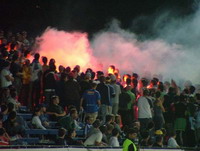Italia tries to deal with soccer violence
Italian soccer does not bring much to cheer about.

Nine months after a policeman was killed in rioting at a game in Sicily, a family is mourning the death of Gabriele Sandri, a Lazio fan who was accidentally shot by a police officer who was rushing to the scene of another clash of supporters.
With soccer violence breaking out on a weekly basis, the words "world champion" won't hold any real meaning until Italy takes much stronger measures against hooligans.
"It's just like a civil war here," said Clarence Seedorf, a Dutchman who has played for Sampdoria, Inter Milan and AC Milan. "It's an incredible situation and we're in the middle of it even though we have no responsibility. This is nothing to do with football."
Seedorf may have a point.
Italian thugs often put on the colors of their local team simply to go out and cause trouble, either with rival fans or with the police. But soccer provides the ideal battleground and can't really escape the blame.
The rioting at the Sicilian town of Catania in February was the outcome of an organized battle between rival gangs connected to the local team and Palermo. Police officer Filippo Raciti was killed as fans clashed with police inside and outside the stadium. About 100 people were injured.
Trying to regain control, Italian soccer authorities suspended the league for a week and 10 of 21 games were played in empty stadiums over the weekend.
It doesn't seem to have worked.
Although the government introduced new anti-hooliganism measures in April, violence at soccer games has continued with followers of Udinese, Napoli, Inter, Juventus, Lazio, Sampdoria, Genoa, Torino and Livorno all clashing with rivals or the police.
The death of Sandri, a 26-year-old disc jockey, happened when police intervened to stop a scuffle between Sandri's group of Lazio fans - headed to see their club play at Inter Milan - and some Juventus fans.
Although police called the death a "tragic error," it was the excuse the fans needed to start rioting. At Atalanta's game against AC Milan in Bergamo, fans tried to break through the protective fence behind the goal and get onto the field. The game was abandoned after only seven minutes.
Rioting broke out in Rome near the Stadio Olimpico and 40 police officers were injured as fans smashed windows, hurled bricks and set fire to police vehicles.
The violence in Italy is reminiscent of the trouble that flared on a regular basis in England in the 1970s and '80s.
That has been almost eradicated, although it took a series of tragic incidents to stop it, including a riot where 39 people died at the 1985 European Cup final between Liverpool and Juventus at Heysel Stadium in Brussels, Belgium.
Almost all the victims were Juve fans and, after blaming Liverpool followers for the riot, UEFA banned all English teams from its competitions.
They stayed ostracized for five years, during which time the British government introduced tough measures to combat soccer violence. It ordered top clubs to make their stadiums all-seaters and install closed circuit security to help police identify and convict hooligans, who received long jail sentences.
In the light of the tragedy of Hillsborough, where 96 fans were crushed to death behind a security fence at the 1989 FA Cup semifinal between Liverpool and Nottingham Forest, Britain even ordered clubs to tear the fences down.
By the time the clubs returned to European club soccer in 1990, incidents of crowd violence in domestic English games had dwindled, although it still flares up occasionally when English clubs and the national team travel abroad.
The situation in Italy is almost the reverse.
It's unusual to hear of soccer violence when Italian teams leave their own shores, while it appears out of control at home.
The fans and the players say that the Italian soccer federation has to make decisions quickly.
Suspending play in Serie A for a few weeks may not be the answer. Playing in empty stadiums for a few weeks may be a help.
The real solution could be something along the lines of the English remedy - modernized, all-seater stadiums, tougher policing and security measures. All that is going to take a lot of money, however, which the government will almost certainly have to find because few Serie A clubs are wealthy enough to pay.
Italian soccer only recently emerged from a match-fixing scandal which led to Juventus being stripped of its league title, getting relegated from Serie A and other clubs being docked league points.
That didn't stop Italy from winning the World Cup last year and AC Milan from capturing its seventh European Cup title in May.
Now the national team aims to reach the 2008 European Championship by beating Scotland in Glasgow on Saturday.
Whatever the Italian clubs achieve on the field, however, is tarnished by events off it. Italy lost the race to stage the Euro 2012 tournament largely because of its problems dealing with domestic soccer violence.
Every victory seems to be followed by a defeat. Italian soccer - and the game itself - becomes the loser.
Subscribe to Pravda.Ru Telegram channel, Facebook, RSS!


